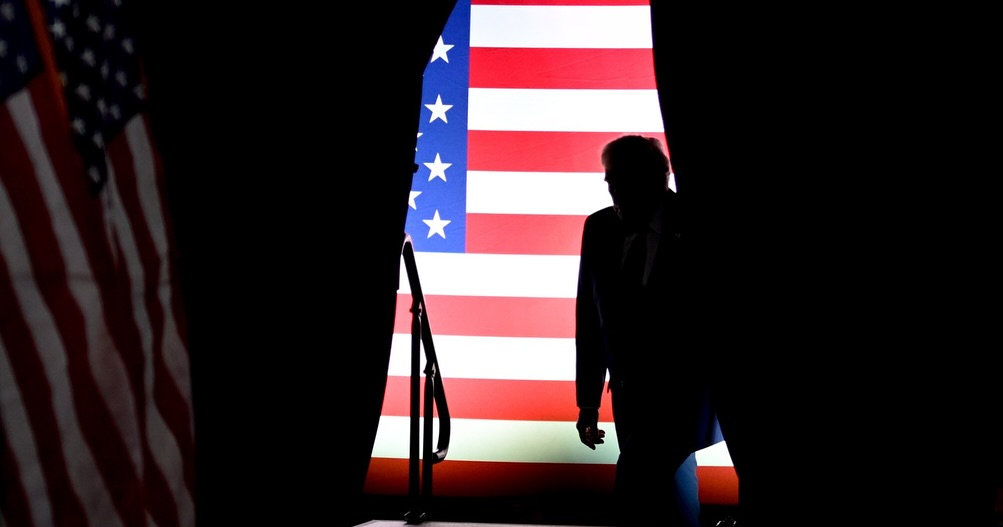By Ashley Morgan, Cardiff Metropolitan University; The Conversation

Trump has surrounded himself with men who promote the stereotype of the alpha male, demean childless women and promote a version of family values that takes away from women’s autonomy. (Fle Photo: Donald J. Trump/Facebook)
The US election was not just about Donald Trump v Kamala Harris, Republicans v Democrats. In a simple sense it was also about men v women. The results show that more men voted for Trump, and more women for Harris.
The discrepancies are particularly notable among young voters. In the 18-29 age group, 58% of women voted for Harris, while 56% of men voted for Trump. This reflects the growing partisan divide in gen Z, where studies suggest young men are becoming more conservative, while young women are becoming more liberal.
Gender played a significant role in the campaign itself, with Harris and the Democrats focusing their message on women’s rights and reproductive health. Trump, on the other hand, courted young men who feel disenfranchised and disillusioned in a changing society.
The president-elect represents a particular type of masculinity: he is seen as brash and straight-talking, and can appear domineering or patronising around women – for example when he famously lurked behind Hillary Clinton during a debate in 2016. For some women who voted for him, this might be a familiar personality that they’ve seen in their fathers and husbands.
For men, Trump represents “hegemonic masculinity”, the exalted position of men at the top. In this view, aggression, control and dominance are all admirable traits and highly socially valued.
As my research has highlighted, oppressing and subordinating others is not the only way of proving masculinity. But it is certainly one of the more obvious ways, and it is particularly dangerous for women’s rights.
Trump has surrounded himself with men who promote the stereotype of the alpha male, demean childless women and promote a version of family values that takes away from women’s autonomy.
During the campaign, Trump vowed to protect women “whether they like it or not”. This implies that women are not considered to be men’s equals and that men are in control of everything, including women themselves.
This kind of “protective masculinity”, and the idea that women need to be protected by men has had a resurgence in US society over the past few decades. This was identified by political scientist Iris Marion Young in the early noughties.
“The stance of the male protector … is one of loving self-sacrifice, with those in the feminine position as the objects of love and guardianship,” she wrote in a paper on the subject. “Chivalrous forms of masculinism express and enact concern for the wellbeing of women, but they do so within a structure of superiority and subordination.”
This structure of superiority and subordination is evident in popular culture and social media movements. Ideas of protection are espoused by “manosphere” influencers who promote this very traditional form of masculinity, such as Andrew Tate (who has been charged with rape and human trafficking, which he denies).
Popular ideas around dating, holding doors for women, paying for meals and general submission to men hark back to a time when women were less able to work or earn as much money, and had fewer rights.
This view of masculinity is also harmful for men, whose emotional and mental health and relationships with women are constrained by its stringent views of gender.
What women are concerned about now
The American feminist Susan Faludi argued in her 1992 book Backlash that throughout history, women’s gains in public and private life have later been used against them.
It could be argued that this phenomenon is evident in the rise of Trump. Women, particularly young women, have made notable gains in education, employment, politics and other rights in recent years.
After the 2022 overturning of Roe v Wade – the court ruling that established the right to an abortion in the US and which represented freedom and rights for many women – and the election of Trump, it is very difficult to see how there will be any strengthening of women’s rights in the US in the coming years.
In the week since the election, blatant misogyny against women has spread on social media in response to Trump’s victory. One of the most viral posts has been from far-right influencer Nick Fuentes, who wrote “Your body, my choice. Forever”, on X (formerly Twitter).
And Trump ally John McEntee joked in a video that the 19th amendment, which granted women the right to vote, “might have to go”.
Women around the world have expressed feeling scared, angry and saddened by his victory. One reason behind this is, of course, Trump’s own behaviour.
Throughout his career, Trump has made countless derogatory comments about women. Last year, he was found liable in a civil trial for sexually abusing the writer E. Jean Carroll in 1996, and of defaming her ahead of the trial. He also faces accusations of two dozen incidences of sexual harassment and assault including rape, which he has denied.
But some of the responses to Trump’s victory also speak to the wider concerns and fears about personal safety and bodily autonomy that women have tried to express for years, only to not be taken seriously by men.
Women around the world are sexually harassed, raped and killed every day. Women are afraid to go out in the dark, and always have been.
There is evidence that even when men do think about women’s fears, that they think those fears are exaggerated or unfounded. Arguably, some men only seem to express concern about women when they have daughters.
What women need from men now is not their protection – they need men to listen to their concerns.![]()
Ashley Morgan, Masculinities Scholar, Cardiff Metropolitan University
This article is republished from The Conversation under a Creative Commons license. Read the original article.





















